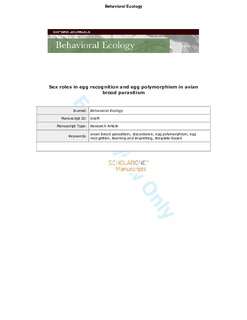| dc.contributor.author | Liang, Wei | |
| dc.contributor.author | Yang, Canchao | |
| dc.contributor.author | Antonov, Anton Tinchov | |
| dc.contributor.author | Fossøy, Frode | |
| dc.contributor.author | Stokke, Bård Gunnar | |
| dc.contributor.author | Moksnes, Arne | |
| dc.contributor.author | Røskaft, Eivin | |
| dc.contributor.author | Shykoff, Jacqui A. | |
| dc.contributor.author | Møller, Anders Pape | |
| dc.contributor.author | Takasu, Fugo | |
| dc.date.accessioned | 2017-10-25T11:55:25Z | |
| dc.date.available | 2017-10-25T11:55:25Z | |
| dc.date.created | 2011-10-13T13:12:15Z | |
| dc.date.issued | 2012 | |
| dc.identifier.citation | Behavioral Ecology. 2012, 23 (2), 397-402. | nb_NO |
| dc.identifier.issn | 1045-2249 | |
| dc.identifier.uri | http://hdl.handle.net/11250/2462093 | |
| dc.description.abstract | Avian brood parasites impose strong selection on their hosts leading to the evolution of antiparasite defenses like egg recognition and rejection. Discordance and template-based cognitive mechanisms may form the base for egg recognition by hosts. For discordance, hosts recognize eggs that constitute the minority in a clutch as alien, whereas in template-based recognition, hosts recognize eggs as alien when they do not match a template that can be innate or learnt. Template-based recognition by learning can be compromised in host species with polymorphic egg color like Paradoxornis parrotbills, hosts of the common cuckoo Cuculus canorus, because a male that learns an egg color in his first breeding attempt can subsequently mate with females having different colors and therefore reject his own eggs. We present a simple conceptual model to understand how an asymmetry in sex roles of care for eggs and egg polymorphism influence the evolution of egg recognition by hosts. We derive host reproductive success in the presence of variation in egg phenotype for both host and parasite. Our model shows that male recognition by learning is disadvantageous unless the host has monomorphic eggs. We suggest that interclutch variation in egg phenotype is the key to understanding the evolution of egg recognition and the sex involved. Key words: avian brood parasitism, discordance, egg polymorphism, egg recognition, learning and imprinting, template-based. | nb_NO |
| dc.language.iso | eng | nb_NO |
| dc.publisher | Oxford University Press (OUP) | nb_NO |
| dc.title | Sex roles in egg recognition and egg polymorphism in avian brood parasitism | nb_NO |
| dc.type | Journal article | nb_NO |
| dc.description.version | submittedVersion | nb_NO |
| dc.source.pagenumber | 397-402 | nb_NO |
| dc.source.volume | 23 | nb_NO |
| dc.source.journal | Behavioral Ecology | nb_NO |
| dc.source.issue | 2 | nb_NO |
| dc.identifier.doi | 10.1093/beheco/arr203 | |
| dc.identifier.cristin | 845130 | |
| dc.relation.project | Norges forskningsråd: 218144 | nb_NO |
| dc.description.localcode | This article has been accepted for publication in [Behavioral Ecology] Published by Oxford University Press. | nb_NO |
| cristin.unitcode | 194,66,10,0 | |
| cristin.unitname | Institutt for biologi | |
| cristin.ispublished | true | |
| cristin.fulltext | original | |
| cristin.fulltext | preprint | |
| cristin.qualitycode | 2 | |
